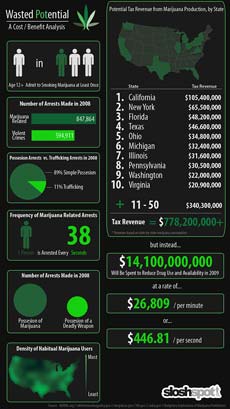November 19, 2009Jon Brooks
It’s one thing to read the Twitter feed from yesterday’s nasty student protest at the University of California Regents meeting at UCLA, it’s another to see the video. This was posted by a group called the National Inflation Association. Student groups are angry at an expected 32% hike in UC tuition in response to the state’s severe budget crisis.
The protest continues today, and AP is reporting students have taken over a building on the UCLA campus.
Jesse Cheng, from the Office of the UC Student Regent, is back on Twitter covering today’s session.
November 18, 2009Jon Brooks
A blog post from Sloshspot–a search site for bars, clubs, and other nightlife activities–called If Marijuana Production Were Legal: Projected Tax Revenues, by State.
Love it or hate it, people smoke marijuana – lots of it. In some states marijuana consumption and posession have been decriminalized, and even legalized for medicinal purposes. But, have you ever wondered how large the economics of Marijuana were? Us too. As a result ,have decided to put together this graphic, which illustrates the popularity of marijuana consumption, the federal tax dollars spent to keep marijuana illegal, and the possible tax revenues that could be generated if marijuana production were legalized and taxed like any other agricultural product. It is especially interesting, with regards to the Great Recession. (Click on chart to see it full size.)

November 18, 2009Jon Brooks
Nate Silver of the political polling site FiveThirtyEight suggests the performance of health insurance stocks might be one way to neutrally evaluate the chance of health care reform’s success:
It’s a bit hard to assess where we are in the health care debate. On the one hand, the (House) Democrats pushed through and passed a bill…clearing a hurdle that meaningful health care reform has never before cleared. On the other hand, the vote in the House was perilously close, there were new complications introduced by the Stupak amendment, and the bad jobs numbers and arguably the outcomes of the elections last Tuesday Virginia and New Jersey last will give nervous lawmakers plenty to worry about.
One leading indicator of the prospects for health care reform so far has been the performance of the half-dozen or so publicly-traded health insurance company stocks. Favorable developments for health care reform have been met with decreases in the prices of these stocks, and unfavorable developments with improved valuations….
I don’t necessarily think that the stock market is particularly adept at forecasting political risk, but to the extent that you’re looking for an objective assessment of the consequences of (the) results for the Democratic agenda, this is a pretty decent one.
If you’re interested in keeping a running tab on the share prices of Big Healthcare (Aetna, UnitedHealth, Cigna, Wellpoint, Humana) you can do so at Yahoo! Finance, using this link. (By the way, the share prices of all these companies have increased over the past month.)
November 18, 2009Jon Brooks
Quick note related to yesterday’s post about financial savant Norel Roubini’s latest jeremiad on the coming economic poopstorm: Someone at Gawker’s tired of all the negativity, evidenced in this post: Professor Norel Roubini’s Timeline of Terror.
November 18, 2009Jon Brooks
This is pretty dramatic. The University of California Office of the Student Regent is Twittering the UC Regents meeting in which the University system’s overseers are expected to vote for a tuition hike. As noted in our last post, students have called for a three-day strike to protest the increase.
Last Tweet, 26 minutes ago:
police have entered the meeting to remove the students, the students aren’t moving, aren’t speaking
November 18, 2009Jon Brooks
California is suffering a severe budget crisis, and the state university system is taking its lumps. The University of California Regents are meeting over the next three days to vote on student fee hikes to cover budget shortfalls.
From today’s San Francisco Chronicle:
Meeting in Los Angeles, the regents are expected to approve a 32 percent student fee increase, the eighth hike since 2002, pushing annual tuition above the $10,000 mark for the first time. Under UC President Mark Yudof’s proposal, students would begin paying an incremental 15 percent increase as soon as next semester. The regents also are expected to vote on fee increases to 44 graduate programs. UC officials say the fee hikes are necessary to close this year’s funding gap of $535 million, largely the result of reduced state funding and inflation…
You can follow on-the-spot accounts of meeting on this web site or via Twitter.
To protest the increase, UC student groups have called for a three-day strike, starting today. The UC Solidarity web site is the online organizing hub for the action.
Here’s an affecting if somewhat melodramatic video promoting the strike.
November 18, 2009Jon Brooks
First we read that market savant Norel Roubini thinks the economy is going nowhere fast. Now we see that UC Berkeley economist Brad DeLong has had a change of heart and pegs the chance of a new Great Depression at 5%.
For 2 1/4 years now I have been saying that there is no chance of a repeat of the Great Depression or anything like it–that we know what to do and how to do it and will do it if things turn south.
I don’t think I can say that anymore. In my estimation the chances of another big downward shock to the U.S. economy–a shock that would carry us from the 1/3-of-a-Great-Depression we have now to 2/3 or more–are about 5%. And it now looks very much as if if such a shock hits the U.S. government will be unable to do a d—– thing about it.
Continue Reading
November 17, 2009Jon Brooks
From The Awl blog:
Homeless Chic? It Still Costs Thousands of Dollars

“So let’s see! That’s $1765 already, not counting the two shirts and the boots, for what basically look like exquisitely-made clothes you found in a dumpster. Also don’t forget what are surely a $140 pair of socks. (Do the kids wear socks these days?) So this is basically a $3000 outfit.
The designer is Michael Bastian. And I like him!…His spring line is a very odd combination of garbage casual wear and gorgeous suits. But these fall clothes, all homeless-style—well, you know, it turns out to maybe not have been a great time to do this?”
Yeah. Maybe not.
November 17, 2009Jon Brooks
In the last couple of years, Norel Roubini has become almost a household name (at least if you live with with someone in the financial industry) for his pre-crisis predictions that the U.S. was headed for a financial catastrophe. From Wikipedia:
In 2008, Fortune magazine wrote that: “In 2005 Roubini said home prices were riding a speculative wave that would soon sink the economy. Back then the professor was called a Cassandra. Now he’s a sage.” In September 2006, he warned to a skeptical IMF that: “The United States was likely to face a once-in-a-lifetime housing bust, an oil shock, sharply declining consumer confidence, and, ultimately, a deep recession.”He also foresaw “homeowners defaulting on mortgages, trillions of dollars of mortgage-backed securities unraveling worldwide and the global financial system shuddering to a halt.”
So the dude is like E.F. Hutton. When he talks, people listen. And here’s what he’s saying now, in a post on his RGE Monitor web site. (The piece also appeared in the New York Daily News.) The gist: More stimulus needed, right now, or else…
Continue Reading
November 17, 2009Jon Brooks
From CNNMoney:Stressful jobs that pay badly. No. 1 on the list? Social worker!
So this one’s for you, social workers, who work for little recognition and paltry salaries to support people who otherwise might fall off the edges of the earth. From Fried Social Worker Blog.
Related posts:



